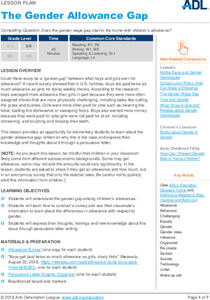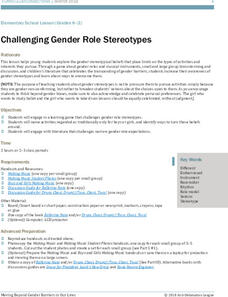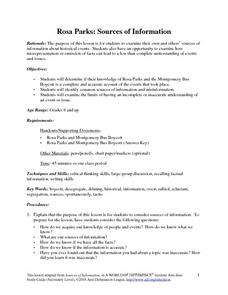Anti-Defamation League
What is the Soul Cap and Why Was it Rejected for Olympic Use?
In 2021 the FINA, the International Swimming Federation, banned using Soul Caps in the Tokyo Olympics. Middle schoolers investigate why the committee made this decision and the resulting backlash, including charges of discrimination and...
C3 Teachers
Call for Change: What Did It Take for Women to Be Considered “Equal” to Men in New York?
An inquiry-based lesson challenges fourth graders to examine who had voting rights in New York when it was founded, women's roles, and how they entered politics. Scholars participate in thoughtful discussions and show what they know...
Anti-Defamation League
Major League Baseball and the Negro Leagues: Correcting an Injustice
It's been a long time coming! In 2020, MLB Commissioner Robert D. Manifred, Jr. stated that "the Negro Leagues would be recognized as official major leagues." Middle schoolers investigate the history of the Negro Leagues and use evidence...
Anti-Defamation League
Intent vs. Impact: Why Does it Matter?
Contrary to the popular saying, words can hurt. Words matter! Tweens and teens can reflect on how words impact others even if the intent wasn't how the words were perceived. After examining an Instagram post where Lizzo apologized for...
Anti-Defamation League
Emojis and Me
A activity features the work of O'Plérou Grebet, a graphic designer who created a collection of emojis to represent his life in West Africa. Scholars explore the history and purpose of emojis, then read and discuss an article about...
Anti-Defamation League
The Gender Allowance Gap
Does the pay gap begin with allowance? That is the big question scholars answer in a lesson plan examining how gender affects how much money an individual earns. Class members conduct a survey to identify how the allowance is paid, take...
Anti-Defamation League
What "Draw-A-Scientist" Reveals about Gender Stereotypes
What do you picture when you hear the word scientist? Challenge scholars to put pencil to paper, draw a scientist, and then reflect on the patterns they observe. Learners read an article about a female scientist and write a story about a...
Anti-Defamation League
Bellen Woodard, Identity, and “Crayon Activism”
Scholars learn about a young child turn activist and author, Bellen Woodard. Learners discuss identity, the importance of representation, and how activism makes a difference. Small groups brainstorm ways to create change and the steps to...
Anti-Defamation League
Identity, Hair and Seeing Myself
Scholars read about and discuss how seven-year-old Morgan Bugg wrote a company to add avatar styles that reflect her. The company realized its error and added more inclusive styles to its avatars. Learners reflect on identity, what...
Anti-Defamation League
Lonnie Chavis of 'This Is Us' Writes about Racism
Scholars read and discuss an essay by 12-year-old actor Lonnie Chaves about racism, paying close attention to how racism presents itself in interpersonal and institutional ways. Learners reflect on how they experience or witness racism...
Anti-Defamation League
Job Roles without Gender Boundaries
A lesson examines gender stereotypes and how they relate to career choices. Small groups look closely at job titles, identify gender bias, and brainstorm ways to add inclusivity. Individuals reflect on their interests and future career...
Anti-Defamation League
Challenging Gender Role Stereotypes
Through thoughtful discussion and a read-aloud, scholars challenge gender role stereotypes. Pupils examine pictures and collaborate with their small groups to debunk stereotypes. They explain what gender role stereotypes they know of and...
Anti-Defamation League
Rosa Parks: Sources of Information
Young scholars show what they know about Rosa Parks and the incident on one of the buses in Montgomery, Alabama. Groups discuss and identify where they receive most of their information. They examine the importance of having a complete...
Anti-Defamation League
We Were Strangers Too: Learning About Refugees Through Art
Did you know that "in the largest refugee crisis since World War II, more the 64 million people have been forced from their homes"? The Anti-Defamation League presents an activity that asks class members to examine a series of artworks...
Anti-Defamation League
Social Justice Poetry
Learners gain insight into how songs and poems express feelings of injustice. They also learn about literary devices and types of poems and make a personal connection when they write their own free verse poems about injustice.
Anti-Defamation League
7 Ideas for Teaching Women's History Month
Celebrate Women's History Month with hands on-learning. The resource provides seven strategies to help educators teach Women's History Month, ranging from watching films to reading books written by women. Activities including writing...
National Endowment for the Humanities
Women's Suffrage: Why the West First?
Eleventh graders discuss the granting of voting rights to women in several Western states. They take a stand, supported by historical evidence, as to whether or not a single theory explains why Western states were the first to grant full...
Core Knowledge Foundation
The Civil War
A student reader shares information about the history of slavery, the Civil War, President Abraham Lincoln, women's contributions to the war, the Emancipation Proclamation, and reconstruction.
University of Minnesota
Neuropathfinding: Kinesthetic Model
Playing follow the leader has never been so interesting! Get the class up and moving while they take on the roles of nervous system components. Through trial and error, they learn the importance of the "pioneer" growth cone that leads...
Core Knowledge Foundation
Early Presidents and Social Reformers
An ebook by Core Knowledge features information about early United Stated presidents such as George Washington and Thomas Jefferson and social reformers such as Sojourner Truth and Frederick Douglas.
C3 Teachers
Reparations: Why Are Reparations Controversial?
To understand why the topic of reparations is controversial, young scholars gather background information by reading articles, watching videos, and examining cases where reparations were made. Learners consider the lasting repercussions...
C3 Teachers
Black Genius: How Did Black Genius Help Build American Democracy?
"How did the slavery system undermine the United States' democratic principles?" This question launches a study of how the Preamble to the Declaration of Independence, Article I, Section 2 of the U.S. Constitution, and Article IV,...
PBS
Amid Rising Economic Inequality, Does America Need a Third Reconstruction?
Young political scientists investigate the Poor People's Campaign protest held in Washington, D.C., on June 18, 2022. They research how the event was reported in various news outlets and consider their stance on whether "poverty is...
PBS
Explore Art and Movement Inspired by Jacob Lawrence’s Migration Series
Panel 58 from Jacob Lawrence's "Migration Series" of paintings provides middle schoolers with an opportunity to sharpen their observation and analytical skills. After engaging in a warm-up activity that introduces the concepts of...

























